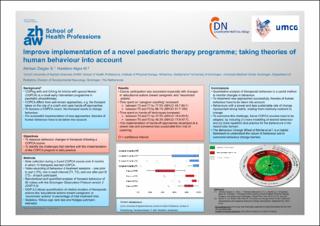Bitte benutzen Sie diese Kennung, um auf die Ressource zu verweisen:
https://doi.org/10.21256/zhaw-19039| Publikationstyp: | Konferenz: Poster |
| Art der Begutachtung: | Peer review (Publikation) |
| Titel: | Improve implementation of a novel paediatric therapy programme : taking theories of human behaviour into account |
| Autor/-in: | Akhbari Ziegler, Schirin Hadders-Algra, Mijna |
| et. al: | No |
| DOI: | 10.21256/zhaw-19039 |
| Angaben zur Konferenz: | World Confederation of Physical Therapy Congress, Geneva, 10-13 May 2019 |
| Erscheinungsdatum: | 13-Mai-2019 |
| Verlag / Hrsg. Institution: | ZHAW Zürcher Hochschule für Angewandte Wissenschaften |
| Sprache: | Englisch |
| Schlagwörter: | Implementation; Theory of human behaviour; Behaviour change; Paediatric physical therapy; Early intervention |
| Fachgebiet (DDC): | 615.82: Physiotherapie 618.92: Pädiatrie |
| Zusammenfassung: | Background: ‘COPing with and CAring for Infants with special Needs’ (COPCA) is a novel family-centred early intervention programme in paediatric physiotherapy. COPCA differs from well-known approaches, e.g. the therapist takes on the role of a coach and uses hands-off approaches. This implies, that to become a COPCA-coach, the therapist needs to change behaviour. Thus, it may be assumed that for successful implementation of new approaches, theories of human behaviour have to be taken into account. Purpose: The study aims to measure behaviour changes in therapists following a COPCA course in order to identify the challenges that interfere with the implementation of the COPCA program in daily practice. Methods: Data were collected during a three-part COPCA course over 6 months (with two months intervals between parts) in which 15 therapists learned to become a COPCA-coach. To document behaviour changes four treatment sessions (one prior to part I T0), one in each interval (T1, T2), and one after part III (T3) of each participant (n=60) were video-recorded and analysed quantitatively with the Groningen Observation Protocol version 2 (GOP 2.0). The videos were randomized and masked to the chronology of recording moment. GOP 2.0 is a quantitative tool to assess therapeutic behaviour in different categories, e.g. “educational actions toward caregivers” or “neuromotor actions”. It allows for a quantification of the relative duration of therapeutic actions (percentage of total treatment time) during a session. Interrater reliability of the GOP 2.0 was evaluated. The first author analysed changes in therapeutic behaviour over time with the Wilcox-sign rank test. Median changes and corresponding non-parametric confidence intervals were computed using the Hodges-Lehmann estimator (HL). Results: Interrater reliability of the GOP 2.0 (ICC2) was 0.48-1.00 (median 0.92). Course participation was associated especially with changes in “educational actions toward caregivers” and “ neuromotor actions”. Time spent on ‘caregiver coaching’ increased: between T0 and T1 by 77.9% (99% confidence interval (CI) 48.7-99.1) and between T0 and T3 by 96.1% (99%CI 51.7-100). Also time spent on hands-off techniques increased, 37.9% (99%CI 18.8-59.5) between T0 and T1 and 40.3% (99%CI 17.8-57.7) between T0 and T3. The implementation of hands-off approaches developed at a slower rate and somewhat less sustainable than that of coaching. Conclusions: Behaviours with a slower and less sustainable rate of change represented strong habits. The neural substrate of strong habits is located subcortically, making them relatively resistant to cognitive input. To overcome this challenge, future COPCA courses need to be adapted, by including (1) more modelling of desired behaviour and (2) more repetition and practice for the behaviours in the neuromotor domain. Implication: Quantitative analysis of therapeutic behaviour is a useful method to monitor changes in behaviour of therapists and – by doing so – may assist the implementation of new approaches. To implement new approaches successfully, theories of human behaviour have to be taken into account. The Behaviour Change Wheel of Michie et al., a method to characterise and design behaviour change in interventions, is a helpful framework to understand the nature of behaviour and to overcome behaviour change barriers. |
| URI: | https://www.abstractstosubmit.com/wcpt2019/archive/#/viewer/1027 https://www.abstractstosubmit.com/wcpt2019/archive/#/viewer/abstract/1027 https://digitalcollection.zhaw.ch/handle/11475/19039 |
| Volltext Version: | Publizierte Version |
| Lizenz (gemäss Verlagsvertrag): | Keine Angabe |
| Departement: | Gesundheit |
| Organisationseinheit: | Institut für Physiotherapie (IPT) |
| Publiziert im Rahmen des ZHAW-Projekts: | Physiotherapeutische Intervention bei Säuglingen mit neuromotorischen Funktionsstörungen |
| Enthalten in den Sammlungen: | Publikationen Gesundheit |
Dateien zu dieser Ressource:
| Datei | Beschreibung | Größe | Format | |
|---|---|---|---|---|
| Poster WCPT 2019.pdf | 933.25 kB | Adobe PDF |  Öffnen/Anzeigen |
Zur Langanzeige
Akhbari Ziegler, S., & Hadders-Algra, M. (2019, May 13). Improve implementation of a novel paediatric therapy programme : taking theories of human behaviour into account. World Confederation of Physical Therapy Congress, Geneva, 10-13 May 2019. https://doi.org/10.21256/zhaw-19039
Akhbari Ziegler, S. and Hadders-Algra, M. (2019) ‘Improve implementation of a novel paediatric therapy programme : taking theories of human behaviour into account’, in World Confederation of Physical Therapy Congress, Geneva, 10-13 May 2019. ZHAW Zürcher Hochschule für Angewandte Wissenschaften. Available at: https://doi.org/10.21256/zhaw-19039.
S. Akhbari Ziegler and M. Hadders-Algra, “Improve implementation of a novel paediatric therapy programme : taking theories of human behaviour into account,” in World Confederation of Physical Therapy Congress, Geneva, 10-13 May 2019, May 2019. doi: 10.21256/zhaw-19039.
AKHBARI ZIEGLER, Schirin und Mijna HADDERS-ALGRA, 2019. Improve implementation of a novel paediatric therapy programme : taking theories of human behaviour into account. In: World Confederation of Physical Therapy Congress, Geneva, 10-13 May 2019 [online]. Conference poster. ZHAW Zürcher Hochschule für Angewandte Wissenschaften. 13 Mai 2019. Verfügbar unter: https://www.abstractstosubmit.com/wcpt2019/archive/#/viewer/1027
Akhbari Ziegler, Schirin, and Mijna Hadders-Algra. 2019. “Improve Implementation of a Novel Paediatric Therapy Programme : Taking Theories of Human Behaviour into Account.” Conference poster. In World Confederation of Physical Therapy Congress, Geneva, 10-13 May 2019. ZHAW Zürcher Hochschule für Angewandte Wissenschaften. https://doi.org/10.21256/zhaw-19039.
Akhbari Ziegler, Schirin, and Mijna Hadders-Algra. “Improve Implementation of a Novel Paediatric Therapy Programme : Taking Theories of Human Behaviour into Account.” World Confederation of Physical Therapy Congress, Geneva, 10-13 May 2019, ZHAW Zürcher Hochschule für Angewandte Wissenschaften, 2019, https://doi.org/10.21256/zhaw-19039.
Alle Ressourcen in diesem Repository sind urheberrechtlich geschützt, soweit nicht anderweitig angezeigt.